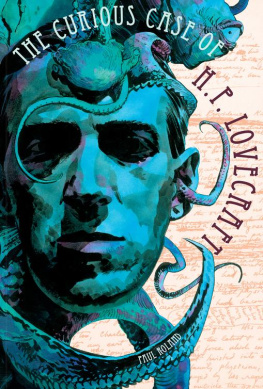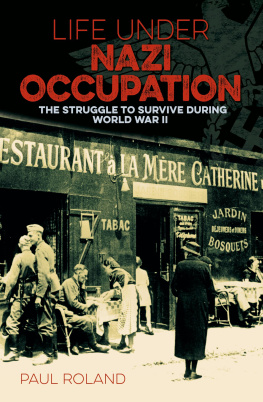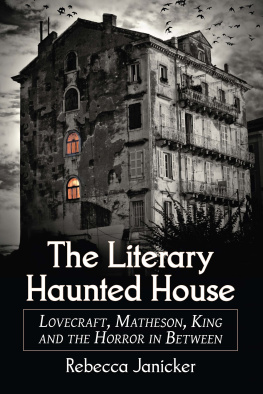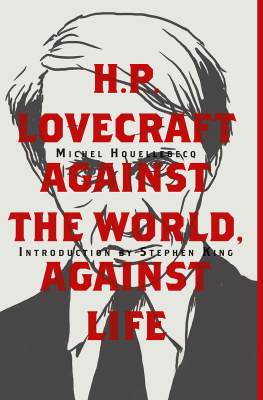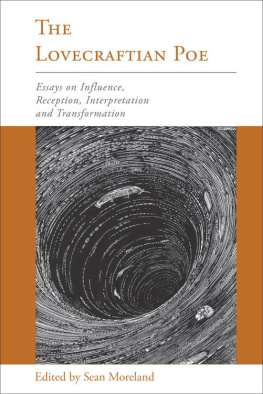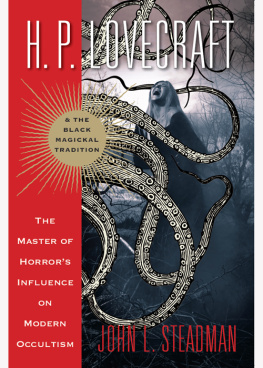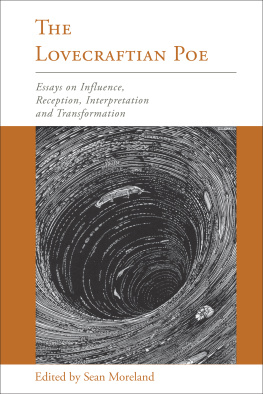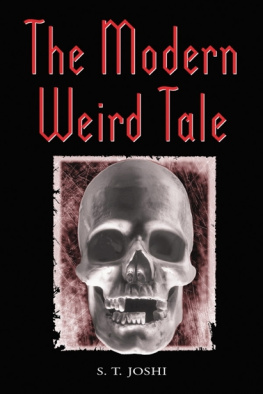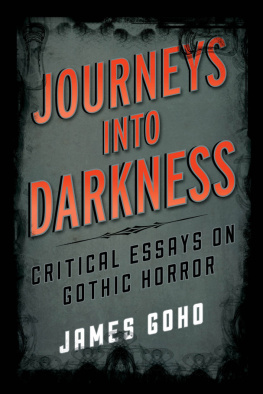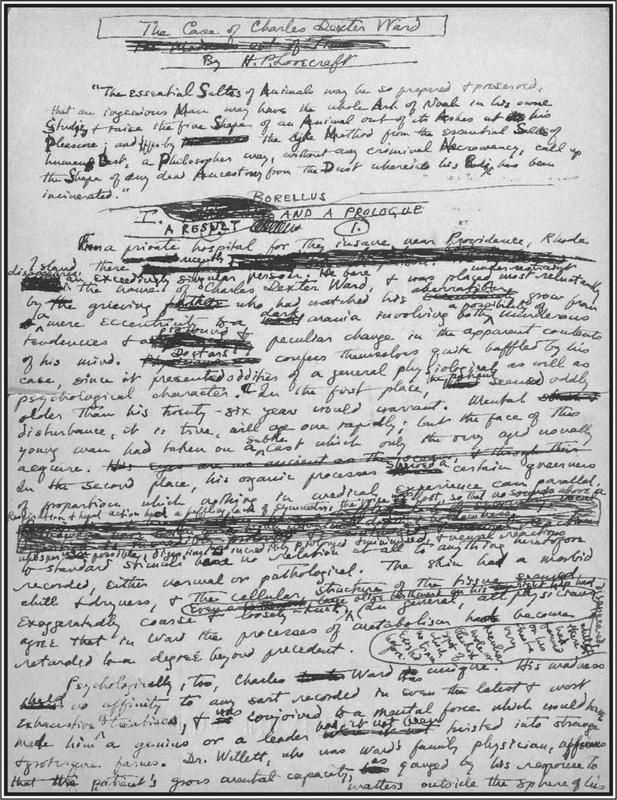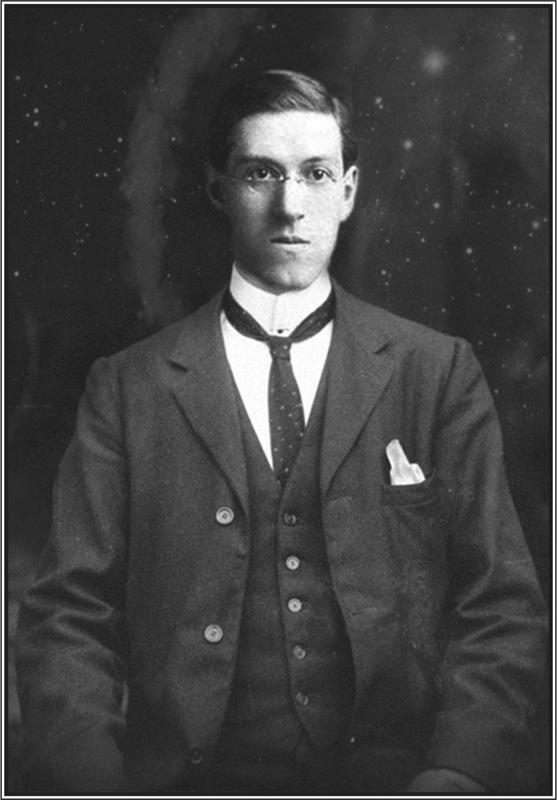To my beloved son Michael.
Dare to dream, but dont forget to come back
AUTHORS NOTE: I began planning a biography of H.P. Lovecraft in the mid-nineties. At this time, I could find only a handful of American academic titles devoted to his life, in addition to Lin Carters A Look Behind the Cthulhu Mythos (1972), L. Sprague de Camps Lovecraft: A Biography (1975), S.T. Joshis H.P. Lovecraft: The Decline of the West (1990) and an anthology of essays edited by Joshi and Schultz entitled An Epicure in the Terrible (1991). Little else was in print and available outside the States with no internet sources. I persisted periodically over the next twenty years, believing that there was a need for a popular but comprehensive biography, assessing every one of Lovecrafts published stories. I hope that The Curious Case of H.P. Lovecraft fills this niche.
I would like to give special thanks to my editor Laura Coulman for her invaluable contributions and to Sandra Wake at Plexus for having faith in me and in this project. Thanks are also due to Nicky Adamson for her extensive editorial suggestions, April James, Coco Balderrama for creating the look, and Sean Phillips for allowing us to incorporate his stunning original artwork on the cover of the book.
Dates in parenthesis after story titles indicate the year of completion, not publication.
EDITORS NOTE: We would like to give our thanks to the meticulous Lovecraftian scholar Pietro Guarriello, for his invaluable pictorial contribution. We are also grateful to the following individuals: Ann Morgan Dodge of Brown University, who provided sterling guidance throughout the process of picture research; Sean Branney and Andrew Leman of the H.P. Lovecraft Historical Society; James Van Hise; Frank H. Woodward (producer of the excellent documentary, Lovecraft: Fear of the Unknown); Danielle Jacobs at Arkham House; William R. Coker; Jerad Walters at Centipede Press and Donovan Loucks at the H.P. Lovecraft Archive. All of these individuals provided kind and prompt assistance in my endless search for rarer images of H.P. Lovecraft. I would also like to extend my sincere gratitude to Susan Areson at the Providence Journal, who kindly gave permission for Sonia Greenes illuminating article, Howard Phillips Lovecraft as his Wife Remembers Him to be reproduced within this book.
You need to read him hes where the darkness starts.
Neil Gaiman
H oward Phillips Lovecraft was haunted by demons. They stalked him in daylight and darkness alike, from childhood until his premature death at the age of 46. They took the form of his earliest memories of losing his father; of life with his hysterical, emotionally abusive mother.
They leered over his shoulder as he gazed at the distorted reflection in the glass. They taunted him as he struggled to endure blinding migraines, crippling fatigue and periodic breakdowns debilitating psychosomatic disorders which threatened to suck his vitality and curtail his creativity. He fled from them in his sleep in dreams so terrifyingly vivid that they left him fearing for his own sanity and mocked him in the street in the form of evil-looking foreigners who threatened to overrun his picturesque colonial hometown of Providence, New England.
They left him riddled with self-doubt, disappointment and despair, but like a man possessed, he drove them from his mind time and again in bouts of feverish activity. Even as his fortunes declined and various publishing ventures failed to materialise, he worked tirelessly to create an extraordinary and highly influential body of work that has secured him a prominent place in the history of imaginative fiction.
H.P. Lovecraft is widely regarded as the most original writer of modern horror fiction and a pervasive and enduring influence on popular culture. His primordial universe of elder gods and eldritch horrors existing just on the periphery of the more mundane, ordered world we know as reality has inspired authors as diverse as Stephen King, Ramsey Campbell, Robert Bloch, Clive Barker, Alan Moore and Neil Gaiman. Lovecrafts most memorable creatures notably the tentacle-headed god Cthulhu have been invoked by such giants of rock music as Black Sabbath, Metallica and Iron Maiden, and continue to feature in almost every form of fantasy art: from graphic novels to computer games. His compelling creations have influenced the look of major movies such as Alien,Hellboy and even Pirates of the Caribbean although the grotesque otherworldliness of Lovecrafts original tales is yet to be captured by any director onscreen in a way that lives up to the authors fantastic vision in the truest sense of the word. Yet this eccentric and reclusive resident of Providence, Rhode Island, did not have a book published by a major commercial house during his lifetime. He died at the age of 46 in comparative obscurity, convinced that he had failed to achieve the recognition he craved.
The Curious Case of H.P. Lovecraft examines the life and work of the man Stephen King called the twentieth centurys greatest practitioner of the classic horror tale, revealing how Lovecrafts disturbing creations may have been an attempt to exorcise both his inner-demons and the elemental abominations which haunted his recurring nightmares.
There are no happy endings in Lovecrafts world. No light at the end of the dark night of the soul. No hope and no reward for heroic deeds or self-sacrifice. Mankind, according to Lovecraft, exists in an amoral universe at the mercy of destructive forces beyond our comprehension. And yet his vision endures and continues to exert a profound hold on our collective imagination.
Critics have pointed out many shortcomings in Lovecrafts prose, calling it stilted, overwrought, even hysterical, but they overlook the fact that his somewhat overheated style may well have been deliberate. How better to convey the tumultuous inner-state of his characters many of whom are shown to be struggling to maintain their sanity as ardently as the man who created them. These critics also overlook the fact that Lovecrafts single novel, four novellas and 52 short stories were not written to edify, but to entertain. Their primary purpose is to generate a frisson of electrifying excitement, offering the reader a chance to experience vicariously those things they fear and hope never to face; degeneration, death and madness. And in this endeavour, he succeeds admirably.
A master of his chosen genre, Lovecraft understood better than anyone the arc of an effective horror story. Each of his tales represents a heart-stopping, hair-raising fairground ride pausing for just a brief interlude of unsettling silence, before picking up speed for the final descent into darkness. Of course, theres a certain degree of panache and carnivalesque showmanship required to carry it off, saving the story from becoming a bloodless exercise in style over substance but this is an ability that Lovecraft possessed in spades. Playing on instinct rather than intellect, the value of horror fiction cannot be measured by scholarly dissection, but by its ability to crawl under the skin and to linger in the recesses of the mind; to unsettle and to challenge the certainty we seek; to call into question the nature of what we accept as reality. Its grim beauty is in the eye of the beholder and there can be no doubt that Lovecrafts best work exhibits a macabre beauty.

